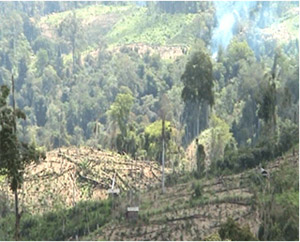|
|
Law enforcement efforts can significantly deter deforestation in protected areas despite high pressure from agricultural expansion, reports a new study that assessed the effectiveness of conservation in Bukit Barisan Selatan National Park in southern Sumatra, Indonesia. However the research suggests that conservation needs extend beyond law enforcement to be effective in the long-run.
Using satellite imagery, ecological data, interviews, and GIS modeling to map tropical deforestation in and around Bukit Barisan Selatan over a 34 year period, David Gaveau and colleagues found that law enforcement effectively “reduced deforestation to nil” in areas where it was undertaken. In remote parts of the park where enforcement activities were lax or non-existent, forest areas were rapidly replaced by low-grade robusta coffee plantations, expansion of which was found to be closely correlated with coffee prices. An estimated 20,000 metric tons-circa 4% of Indonesia’s overall annual robusta coffee production-were produced inside this national park in 2006, and were exported into 52 countries around the world, reported the WWF in 2007. The abandonment of the park by authorities during, and following, the 1997-1998 political crisis also resulted in increased deforestation.
 Deforestation in Sumatra. Photo by David Gaveau |
“These findings indicate that law enforcement is critical but insufficient alone, and also highlight that rising costs of agricultural commodities can be detrimental to tropical forests,” Gaveau, a researcher with the Durrell Institute of Conservation and Ecology and the Wildlife Conservation Society’s Indonesia Program, told mongabay.com. “In southern Sumatra, farmers grow coffee instead of working elsewhere (e.g. in the off-farm sector) because rural labor is poorly compensated (around $2 per day). Therefore, higher local prices for coffee combined with low labour costs, rather than coffee price per se, is the synergistic underlying cause of deforestation in Indonesia’s main robusta coffee producing region.”
The authors argue that preserving forests in Bukit Barisan Selatan over the long run will require a strategy that reduces the incentives for coffee cultivation. They discuss merits of certification schemes for ‘sustainable’ coffee as well as intensification of production, but conclude that raising rural wages relative to coffee prices, in concert with other measures, offers the best long-term hope for curtailing conversion for coffee in the Bukit Barisan Selatan area.
“Better paid off-farm employment, sustained by more off-farm work opportunities in urban areas, with improved levels of rural education, may attract coffee farmers and their children away from protected areas,” they write. “In turn, this would increase rural wages and reduce incentives to cultivate coffee illegally inside PAs. This process, whereby forest cover first decreases, then rebounds following economic development has already occurred in several developed nations, while the same transition is also apparent in a number of developing economies.”
The authors say their findings also raise the more fundamental issue of “whether protecting forests by prohibiting their use by people represents a long-term solution in the context of surrounding poverty.”
“Rethinking the role of protected areas and people in conservation has lead to the development of community forestry conservation projects, where a sustainable form of human use inside protected areas is tolerated,” they write. “Community forestry inside protected areas combined with law enforcement may under the right circumstances assist rural communities in the preparation of long-term plans for agricultural intensification, certification programs, off farm employment and higher education levels.”
Gaveau, D.L.A. et al., Three decades of deforestation in southwest Sumatra: Effects of coffee prices, law enforcement and rural poverty, BIOLOGICAL CONSERVATION (2009), doi:10.1016/j.biocon.2008.11..024